Editor’s note: This is the second of a three-part article about the Mercedes-Benz collision repair certification program, developed through conversations with three Mercedes-Benz USA Certified Collision Center instructors. Special thanks to Kevin King, Technical Collision Instructor & Welding Inspector; Clint Allen, Collision and Technical Trainer, both teaching at the Mercedes-Benz Learning & Performance Center in Grapevine, Texas; and Bob Laurino, Collision and Technical Trainer at the Learning & Performance Center in Robbinsville, New Jersey. (Read Part 1.)
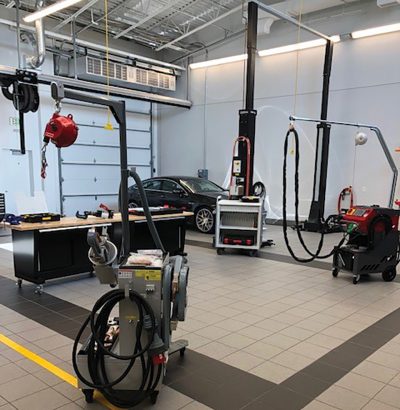
Last time in StarTuned, we discussed the benefits to the independent collision center of becoming a Mercedes-Benz Certified Collision Center. Not just the powerful marketing of the whole Mercedes-Benz organization to drive traffic to your shop; not just access to the right tools, equipment and information to make each repair perfect and more profitable; and not even access to factory training to improve cycle times and quality (not to mention the excellent morale found in well-trained shops): just the prestige alone of being able to put the Star on your wall tells your customers that your shop is the best of the best.
In this issue of StarTuned, we’ll discuss the three tiers of certification: What they mean, what kinds of vehicles are included, the various requirements, and how to get the process started. And for that, the place to start is Base Certification.
Base Certification Tier
All collision repair facilities must meet Base level requirements in order to be in the Mercedes-Benz certification program. Body shops that have been using OEM repair information and providing quality service to their market are already in the right frame of mind for meeting the Mercedes-Benz technician training objectives, tool and equipment requirements, facility image, and customer comfort guidelines.
At least half of your total staff, with a minimum of five, must have Base certification training, with at least one person certified in each of the job areas of Manager/Estimator, Body Repair Technician and Refinish Technician. Your employee’s job code – assigned by Mercedes-Benz according to their job function – allows them to access online and in-person training.
Online courses focus on basic information, such as an introduction to a particular model type and the location and function of major components and systems. Averaging about a half-hour or less, these courses allow the employee to take them at their own convenience, and save time needed for other topics when they arrive at a Mercedes-Benz learning & Performance Center to participate in Instructor-Led Training (ILT).
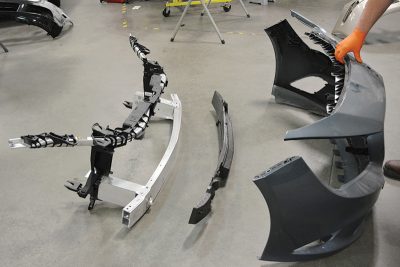
A typical ILT is two days, with about half the time in the classroom and the rest of the time spent in the workshop, actually performing the repairs. Available training courses include collision damage assessment, general body repair, bonding and joining techniques, the use of the Mercedes-Benz Workshop Information System (WIS) and structural heavy damage repair, as well as platform-specific classes. ILT classes are offered at Mercedes-Benz training facilities near Dallas, Texas and Trenton, New Jersey.
More than half the time in an Instructor-Led Training class is hands-on, and that reinforces the theory covered in the online and classroom training. “Technicians tell us they love the hands-on aspect of our classes,†said Bob Laurino, Collision and Technical Trainer at the LPC in Robbinsville, New Jersey. “They like going through the adhesive bonding procedures, working with the rivet gun, doing welding exercises, and so on. The work flow in the shop keeps them interested.â€
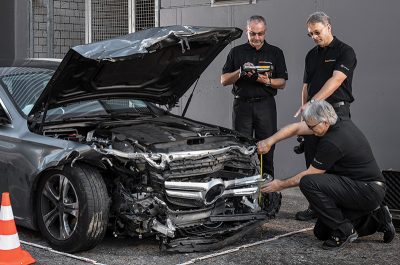
There is also training for estimators, collision managers and facility owners. Mercedes-Benz has structured its certification program to provide assistance to facilities in conducting the Key Performance Indicator (KPI) analysis, business performance reporting and customer satisfaction tracking that helps businesses thrive.
In addition to employee training, Base certification also has specific requirements for shop equipment, customer comfort, shop appearance and processes. Your assigned third-party certification team will guide you through the process.
Elite Certification Tier
Certain Mercedes-Benz models have significant structural aluminum content, and shops wishing to be certified for these vehicles must attain the Elite certification level, as an additional step to the Base level. This requires not only a dedicated aluminum-only workspace, but specialized training and equipment as well.
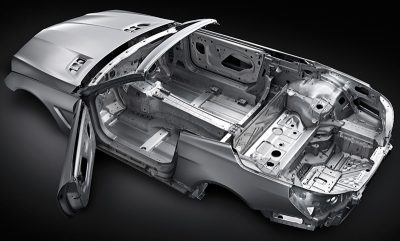
Only collision facilities with Elite certification can purchase most aluminum structural repair parts. Not even a dealer can buy these without this certification. Models with structural aluminum include the SLS, GT and newer SL and S-Class. Of course, non-structural aluminum parts, such as a hood or fender, are not restricted from sale. The structural component sales restriction helps ensure that repairs are made properly, maintaining the vehicle’s integrity and safety characteristics.
As for training, attaining the Elite level requires at least one technician to pass an intensive two-week hands-on aluminum welding course. Welds are destructively tested, and those who don’t pass the course must repeat it. And, in the two-week period, a lot of welds are made.
Maintaining Elite status requires attending a two-day semi-annual welding re-check course, and completing recertification in a three-day welding update course every other year.
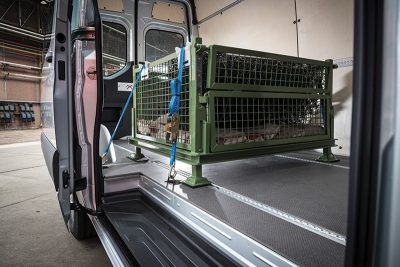
Commercial Certification Tier
To achieve Commercial certification the facility must first meet Base level requirements. Once they’ve become Base certified, they attain Commercial certification by acquiring technician training and equipment for repair of Mercedes-Benz Sprinter and Metris vans. The equipment requirement includes a spray booth with a minimum of twelve feet of interior clearance, a heavy-duty chassis bench, and a lift that can accommodate commercial vans, along with other tools for heavy-duty vehicle repair.
Becoming Mercedes-Benz Certified
Dealer-owned and independent body shops can earn Mercedes-Benz collision repair facility certification. Independent shops must be sponsored by a Mercedes-Benz dealer. Finding a dealer willing to sponsor your shop as a program participant is the easier part, because every Mercedes-Benz new car dealer that does not already operate or partner with a body shop wants to find the best place to refer their customers that are in need of collision repair. Proving that your facility is best-positioned to provide safe, reliable, quality collision repairs can be a bit more involved.
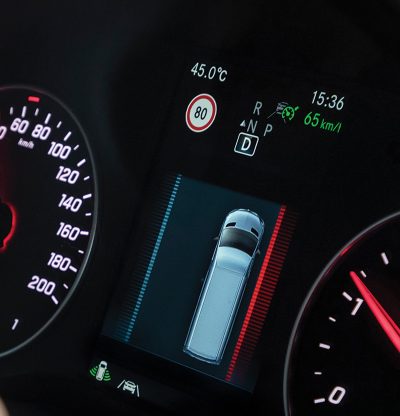
After an initial agreement of a dealer to consider sponsorship, the body shop will be contacted by a 3rd party representative to set up the certification audit process on behalf of MBUSA. Both independent and dealer-owned body shops must meet all equipment requirements, have a facility that meets quality and customer comfort standards, complete at least two instructor-led training (ILT) courses (plus additional online classes) per year, and apply for recertification every two years.
In the next issue of StarTuned, we’ll take a closer look at Mercedes-Benz training, arguably one of the most valuable benefits of collision center certification.
Get Certified!
To learn more about the program, or to apply to become a Mercedes-Benz Certified Collision Center, go to mbcollisioncenters.com and scroll down to the link “Become a Certified Collision Center.†Once there you will find links to answers about a variety of questions, including a list of required tools and equipment, a document containing the standards by which repair facilities, technicians, and staff are evaluated, a brochure that provides an overview of the entire program, and a program application form.
Are you in? Being one of the elite (pun intended) few will benefit your shop, your customers, and Mercedes-Benz. Win-Win!
Breaking News: Car-O-Liner straightening benches added to approved equipment list
Mercedes-Benz USA recently announced the addition of Car-O-Liner straightening benches to the list of approved collision center equipment. With the addition of BenchRack BR5500 and BR6300 benches combined with EVO fixture sets and the Car-O-Tronic® Vision2 X3 measuring system, now Mercedes-Benz Certified Collision Centers have three equipment vendors (including Car Bench and Celette) to choose from for their straightening bench systems. Complete details on the entire Certified Collision Center program, including approved equipment, can be found at www.mbcollisioncenters.com/become-collision-center.

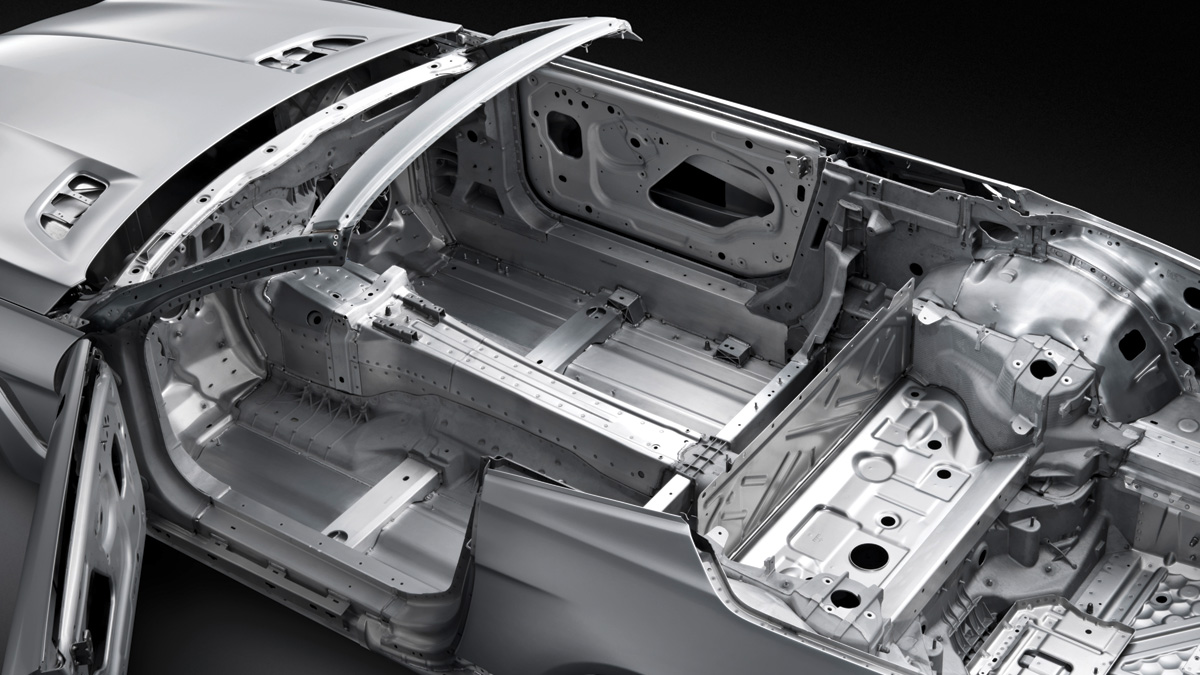
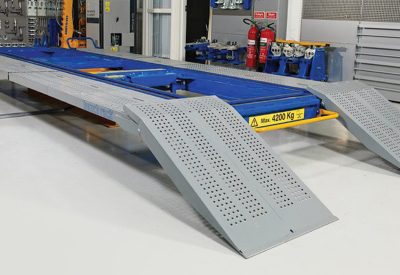

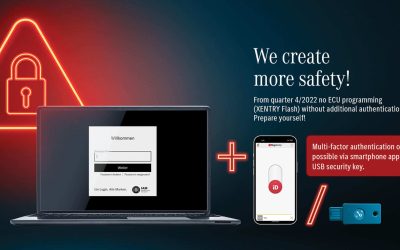
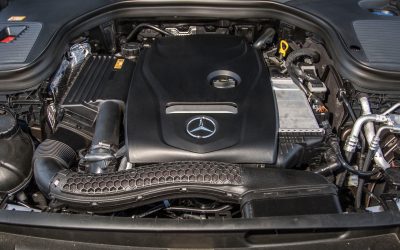
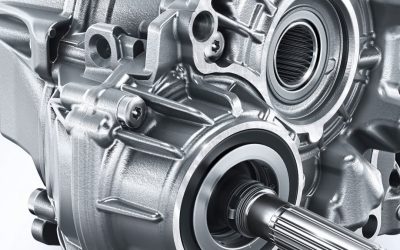
0 Comments